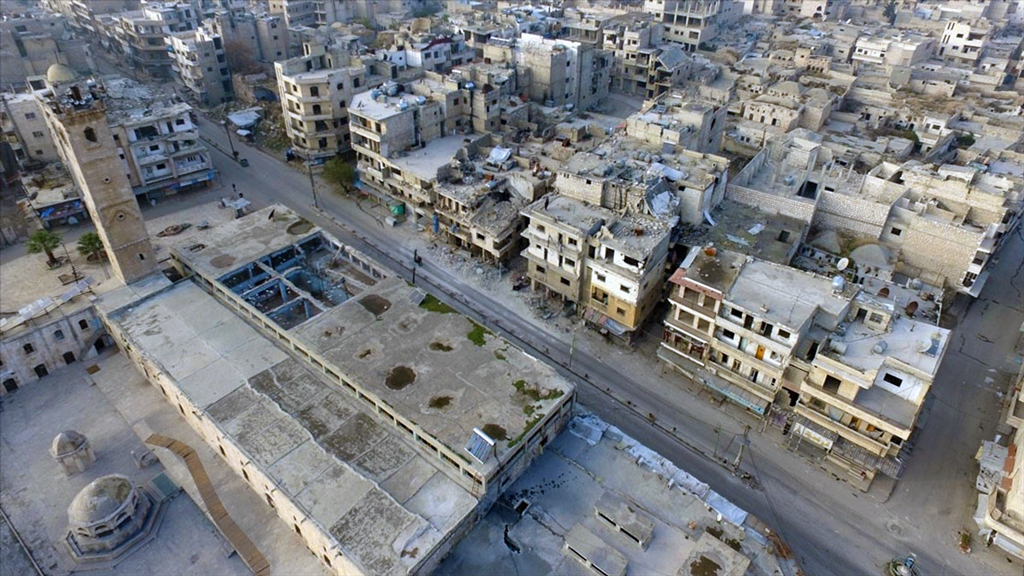[Daily Sabah, 3 February 2020]

Europe, U.S. must save Idlib
Hardly a day goes by without the Bashar Assad regime bombing hospitals, schools and bakeries in Idlib. Since the Jan. 12 cease-fire, more than 130 civilians have died in military operations that undermine both Astana and Sochi peace deals.
Share
Hardly a day goes by without the Bashar Assad regime bombing hospitals, schools and bakeries in Idlib. Since the Jan. 12 cease-fire, more than 130 civilians have died in military operations that undermine both Astana and Sochi peace deals.
The message is clear: Assad and his backer Russia are determined to conquer Idlib step by step, in an attempt to seize control of what remains of the de-escalation zone; even if it means killing scores of civilians and pushing the locals toward the Turkish border.
In the face of those developments, Turkey is committed to keeping its observation posts and stopping the next refugee wave. President Recep Tayyip Erdoğan, unhappy with repeated Russian violations of the cease-fire, made his disappointment public after Maaret al-Nouman fell to the Assad regime.
Following his Africa tour, Erdoğan told reporters that "there is nothing left of the Astana process [because] Russia hasn't been loyal to Astana and Sochi."
Meanwhile, Turkey's National Security Council proceeded to express its "commitment to take additional measures against terror attacks targeting our security forces and the local population in various parts of Syria, starting with Idlib."
Finally, Erdoğan told a Justice and Development Party (AK Party) provincial leaders' meeting that the Turkey-Russia agreement was "being violated step by step" and warned that his country could not "tolerate a new wave of immigration."
The Turkish president also signaled that he would resort to hard power if necessary. "We cannot stand idly by as fresh threats emerge at our borders. In this regard, we cannot afford to watch the developments in Idlib and other parts of Syria from the sidelines," he said.
Erdoğan's most recent remarks suggest that Turkey and Russia have increasingly diverging views on Idlib. The current disagreement places at risk the broader cooperation between the two countries. Moscow says that the Turks could not stop Hayat Tahrir al-Sham (HTS).
Ankara, on the other hand, has continued to decry Russia and the Assad regime's continued attacks and violations of both cease-fires, calling for the preservation of the status quo in Idlib and urging all parties to concentrate on the political process.
Rather than engaging in political talks over areas like Deir el-Zour, Bashar Assad turns his attention to the Idlib de-escalation zone – the final rebel stronghold. Using the presence of HTS operatives and other radical groups in the area as an excuse, the regime has launched indiscriminate attacks on civilians.
It seems that the Turks are officially fed up and actively seeking a new stance. Erdoğan has been talking with U.S. President Donald Trump and German Chancellor Angela Merkel about the international ramifications of the unfolding crisis in Idlib. What the West must understand is that Moscow and Damascus threaten to unleash a new refugee wave of refugees that will not stop at the Turkish border. They want to create a mess that will undermine European democracies. To stop them, Washington and Brussels have to act and mount pressure on Moscow.
Erdoğan's leader-to-leader diplomacy with Vladimir Putin has kept a lid on the brewing crisis in Idlib up until now. But the cease-fires do not function, as the Assad regime speaks no language except hard power. The active conflict in Idlib also threatens to spill over to other parts of the country.
The Astana process, as we know it, has come to a standstill. The Geneva process, too, is beyond recognition. To jumpstart those negotiations, in that order, the U.S. and the EU need to step up – per Erdoğan's recommendation.
As a last resort, they must be prepared to use hard power to protect the civilian population that Bashar Assad has banished from Idlib. The Turkish president's proposal to build housing centers for refugees "30 to 40 kilometers away from the border" could be the first step towards some kind of safe zone. Angela Merkel needs to hurry up: Turkey alone cannot counterbalance the Russians in Idlib.
Europe stands to suffer major setbacks if the balance of power collapses.
Tags »
Related Articles






